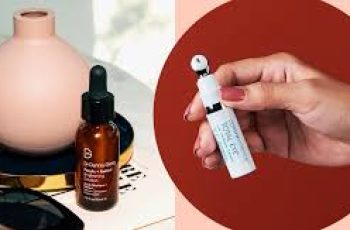
From applying sunscreen with a makeup brush to making so-called skincare “smoothies” by mixing products, the internet is abuzz with questionable beauty tips. That’s why every year we make it our mission to cut through the noise with the help of our little black book of expert dermatologists, cosmetic scientists and estheticians.
Whether you want to refresh your knowledge on the benefits of LED masks or wonder how much you should spend on sunscreen, you’ll find the answers at R29. But it’s been a busy year, so to make it easier for you, here are the eight most valuable skincare lessons for 2024 that we’ve learned from the pros – all for you.
Dry skin? Try a reverse double cleanse.
If you use makeup and sunscreen, double cleansing (using a balm, oil, or micellar water followed by an appropriate water-based cleanser) may come naturally to you. Although a second cleanse is necessary to remove all residue from the treatment product, it often leads to a feeling of tightness and sagging in dry skin, especially when using a cleansing foam.
As a solution, skin expert, nutritionist, founder and CEO of the eponymous skincare brand Kat Burki recommends a reverse double cleanse. “I do the opposite of what everyone else does, with the goal of achieving a deep clean without overwhelming the skin,” Burki tells DermDoctor. “First I use a cleansing gel [i.e. her KB5 Calming Gel Cleanser, £40], then I use a cleansing oil,” she says. “That’s because you don’t want to strip away the nutrients.
If you don’t like the mist that oily cleansers leave behind, try a hydrating cleanser like Medik8 Cream Cleanse (£24), La Roche- Posay Effaclar H+ Cleanser (£16.50) or CeraVe Hydrating Cleanser (£8.38).
How to tell fake sunscreen from real.
In DermDoctor’s global sunscreen event, Sun Blocked, author Morgan Fargo uncovers the murky world of fake sunscreen. Korean beauty brands like Round Lab and Beauty of Joseon are often victims of counterfeits, and the difference between fakes and the real thing is often unnoticeable to the naked eye. But there are steps you can take to ensure you’re buying the real thing and protecting your skin properly.
Skin cancer expert Dr. Paul Banwell tells DermDoctor: “Don’t trust very low prices – they’re often too good to be true – and don’t buy from unverified sellers. It’s a gamble that’s simply not worth it. Then check the packaging for any typos or missing certifications, and make sure it’s sealed intact upon delivery. ” Stick to reputable retailers you trust and avoid third-party sellers.
SPF doesn’t have to cost a lot.
When it comes to sun protection, a common misconception is that the more you spend, the better the product will protect your skin from UV damage. The truth is: price doesn’t matter. An effective sunscreen should be “broad spectrum” so that it protects the skin from both UVA and UVB, and most dermatologists recommend a sun protection factor (SPF) of at least 30.
“Affordability is relative, but you shouldn’t feel guilty if you use [your sunscreen], or worry about how much it will cost to replace it,” aesthetician Alicia Lartey told R29. “Personally, I don’t see why an SPF should cost more than £50 – unless it’s by the gallon.”
Lartey believes there are many good and affordable sunscreens to choose from. R29 rated e.l.f. Suntouchable Invisible Sunscreen SPF 30 is £14, The Inkey List Polyglutamic Acid Dewy Sunscreen SPF 30 is £15 and Neutrogena Hydro Boost Hydrating Fluid SPF 50 is £16.50. Ultimately, however, choosing the right sunscreen comes down to your personal preference and budget.
LED masks are actually pretty awesome.
You might be quick to dismiss LED masks as a gimmick, but experts say they offer real benefits as long as you stick with them. Dr. Jonathan Kentley, a British Skin Foundation spokesperson and consultant dermatologist, told R29: “Red and blue light therapy has been shown to be effective in treating acne by targeting sebaceous glands, killing bacteria and reducing the number of inflammatory spots.”
That’s not all. Light therapy can increase the production of collagen and elastin, which give the skin structure. “Studies have shown that skin hydration, structure and elasticity are improved, and the number of wrinkles is reduced,” said Dr. Kentley. Not all LED masks are the same. So if you’re considering buying a mask, we’d love to help you do your research.
Your lips aren’t just dry. They can be damaged by the sun.
When DermDoctor senior writer Venus Wong asked a dermatologist last summer why her lips were always dry, she didn’t expect the answer to be sunburn. “Despite my diligent application of sunscreen every day (on my face and body, and every two hours), I’ll be the first to admit that I often forget to use it on my lips,” Wong wrote.
“My lips.” She asked dermatologist Dr. Derek Phillips for advice. “The skin on your lips is different from the skin on the rest of your body,” he told her. “It’s thin and fragile, and it loses moisture easily. Your lips are also frequently exposed to the sun’s UV rays, which over time can lead to further thinning, redness, and hyperpigmentation, and increase your risk of skin cancer.”
A nourishing lip balm with moisturizing ingredients like lanolin, glycerin, and hyaluronic acid is key to relieving dryness, and buying one with an SPF of at least 30 will also protect your lips from harmful UV rays. Try Bondi Sands SPF 50+ Lip Balm, £3.30, Lanolips Tinted SPF 30 Lip Balm, £8.99, or Paula’s Choice Lip Balm SPF 50, £14, which don’t have a bitter taste.
Dandruff can’t be ‘cured’, but it can be easily managed.
Your scalp is an extension of your facial skin, so it makes sense that it requires a similar level of care – especially more regular washing. Trichologist Anabel Kingsley says going too long between washes can lead to increased dandruff, which appears as tiny white flakes. There’s no cure for dandruff, but it can be easily managed.
“If you don’t wash your face every day, it gets greasy,” Kingsley tells DermDoctor. “On your scalp, dead skin cells have nowhere to go, so they remain trapped at the roots of your scalp and in your hair. Massaging while you wash exfoliates [the scalp].”
Kingsley recommends using an anti-dandruff shampoo, such as Philip Kingsley Flaky Itchy Scalp Shampoo (£30), and using every last drop. Once the dandruff subsides, she suggests keeping a bottle in the bathroom and using it every other shampoo to keep it in check.
If you want to spend less, you could also try STRAAND The Crown Cleanse Concentrated Anti-Dandruff Prebiotic Shampoo (£20), currently on sale for £15, or Vosene Original Anti-Dandruff Shampoo (£2.15).
It’s time to rethink our relationship with tanning accelerators.
Last summer, beauty journalist Tori Crowther exposed the dangers of tanning accelerators. They are usually sold as gels or lotions and contain ingredients such as beta-carotene extracted from carrots or tanolol SPE extracted from the carob plant.
These ingredients are said to be “activated” by UV rays, increase melanin (the skin’s natural pigment) and promote tanning. But here’s the thing: tanning, whether in an indoor tanning bed or outdoors on the beach, can lead to melanoma, one of the most common skin cancers. The ingredients in tanning accelerators aren’t inherently bad, but the premise is.
“One disturbing misconception about tanning accelerators is that they shorten the time it takes to tan,” Crowther wrote. “The less time you spend in the sun, the better, right? But it’s not so clear. Tanning accelerators lull users into a false sense of security.”
Ellie Rashid compared tanning accelerators to the idea of smoking a short cigarette. “It doesn’t make sense to say they’re safer because they limit the amount of time you can smoke,” she told R29. As a result, you will no longer find tanning accelerators on the DermDoctor website going forward.
People with darker skin are more likely to be deficient in vitamin D, but SPF can still be beneficial. In a piece titled “Vitamin D Myths Stop Black People from Using Sunscreen,” L’Oréal Blackett, editor of DermDoctor Unbothered, acknowledged that while regularly applying sunscreen protects the skin from harmful UVA and UVB rays, which can prevent radiation that can cause premature aging and skin cancer, she is often asked the question, “If black and brown people are more likely to be deficient in vitamin D, should black people use sunscreen?”
Blackett found that scientists agree on one thing: People who use sunscreen every day can maintain their vitamin D levels. “Most people don’t use enough sunscreen (daily) to really worry about how much vitamin D their bodies are actually absorbing,” adds aesthetician Alicia Lartey. “If you live in a climate like the UK or in the northern hemisphere, you’ll need to take an extra vitamin D supplement anyway,” she continues.
In other words, it’s worth investing in a good quality vitamin D supplement and a broad-spectrum sunscreen with an SPF of at least 30 to protect your skin from harmful UV rays.


